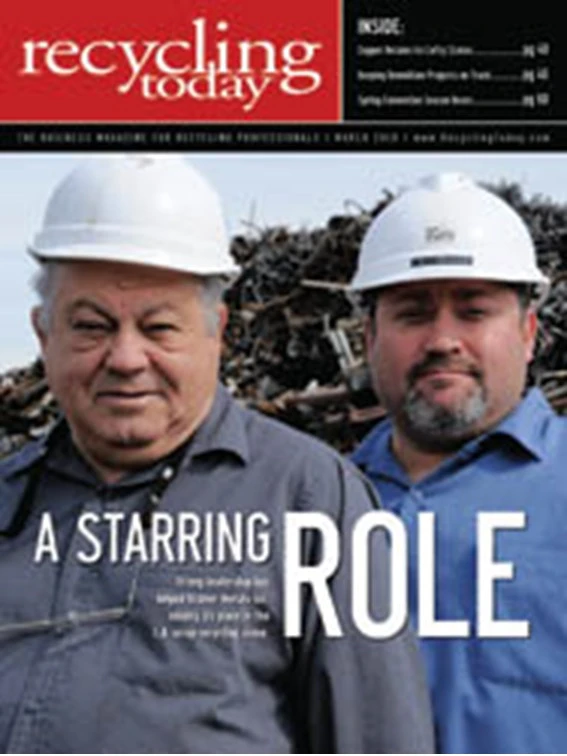Research Report Forecasts Growth in E-Cycling
A market study released by ABI Research, Oyster Bay, N.Y., called “E-Waste Recovery and Recycling,” forecasts that the worldwide market for electronic scrap recovery will grow from $5.7 billion in 2009 to nearly $14.7 billion by the end of 2014, representing a compounded annual growth rate of 20.8 percent during the forecast period. This figure represents money generated through reclamation of materials from electronic scrap, ABI says.
According to the report, this growth is spurred by rising electronic scrap collection and recycling rates; the growth in innovative and cost-effective recycling technologies; the strengthening recycling infrastructure and legal framework worldwide; global electronics markets and their growth in developing economies; and the integration of formal and informal recycling markets in Asian locations.
“Plummeting commodity prices shriveled demand for recycled materials and transformed recycling from [a] profitable venture to a cash-hemorrhaging dilemma for a multitude of municipalities and companies,” says Larry Fisher, director of the report.
However, he adds, “The combined impact of the ongoing global economic recovery and strengthening e-waste recycling legislation worldwide will drive improved recycling/recovery rates in each of the next five years.”
Oregon E-Cycles Program Collects 19 Million Pounds in First Year
The Oregon E-Cycles Program, which is made up of a network of more than 200 collection sites and recycling facilities throughout Oregon, reported that 18.9 million pounds of obsolete electronics were collected in 2009, the program’s first year. Unwanted computers, monitors and televisions are collected from the public at no cost.
The program, administered by the Oregon Department of Environmental Quality (DEQ), officially launched Jan. 1, 2009. Oregon E-Cycles requires electronics manufacturers to fund a program to provide free electronics recycling services to residents in the state. Manufacturers choose to either pay a recycling fee to participate in a DEQ-administered state contractor program or to implement and pay for their own statewide collection program.
“We suspected there was a lot of pent-up demand for these kinds of services,” says Kathy Kiwala, DEQ project lead for Oregon E-Cycles. “Given that e-waste is the fastest-growing waste stream in America, coupled with the rate at which people purchase new electronics, it’s not surprising there’s a glut of e-waste just waiting to be recycled.”
For 2010, the state says it expects to collect more than 21 million pounds of electronics. The total could be bolstered by a new law that went into effect Jan. 1, 2010, making it illegal to dispose of computers, monitors and televisions in the garbage or at landfills.
In 2009, about 220 Oregon E-Cycles collection sites operated throughout the state. That number has risen to nearly 250 sites in 2010. The program requires each participating collection program to establish, at a minimum, a collection site in every city with a population of 10,000 or more and a collection service in each county.
CRT Processing LLC Makes New Year’s Change
CRT Processing LLC, Janesville, Wis., has changed its name to Universal Recycling Technologies LLC (URT). In a news release, the company says the new name better represents its expansion into additional services, product lines and locations since its founding in 2003.
URT says it has grown beyond the recycling of cathode ray tube (CRT) computer monitors and now offers “complete solutions for universal waste, e-waste, asset management, convenient pre-paid pack-and-ship recycling box programs and even manufactures its own proprietary recycling equipment.”
The company has eight locations and says the Seattle-based Basel Action Network (BAN) has qualified the company as an “eSteward.”
Company President Jim Cornwell says, “At URT, we guarantee responsible and ethical cradle-to-grave recycling. All end-of-life equipment is processed under our strict supervision—never exported offshore—providing our customers with absolute peace of mind and optimal service. We feel fortunate to work with a forward-thinking group of customers with similar goals and look forward to continuing to grow to best serve them.”
More information on URT can be found at www.universalrecyclers.com.
Texas Tallies Consumer Participation in Computer Recycling Program
The Texas Commission on Environmental Quality (TCEQ), Austin, has announced the first-year results for the state’s computer recycling program. The state’s program requires computer manufacturers that sell in Texas to offer consumers free recycling for their computer equipment. Manufacturers collected 12.5 million pounds of computer equipment for reuse or recycling in 2009, according to the TCEQ.
Currently, 81 manufacturers representing 116 brands are participating in the program, the TCEQ reports.
Manufacturers must submit an annual recycling report to the commission by Jan. 31 of each year noting the weight of the computer equipment collected, recycled and reused during the preceding calendar year.
A link to each manufacturer’s program as well as additional information for consumers, manufacturers and retailers is available at www.TexasRecyclesComputers.org.

Explore the March 2010 Issue
Check out more from this issue and find your next story to read.
Latest from Recycling Today
- Nucor receives West Virginia funding assist
- Ferrous market ends 2024 in familiar rut
- Aqua Metals secures $1.5M loan, reports operational strides
- AF&PA urges veto of NY bill
- Aluminum Association includes recycling among 2025 policy priorities
- AISI applauds waterways spending bill
- Lux Research questions hydrogen’s transportation role
- Sonoco selling thermoformed, flexible packaging business to Toppan for $1.8B





